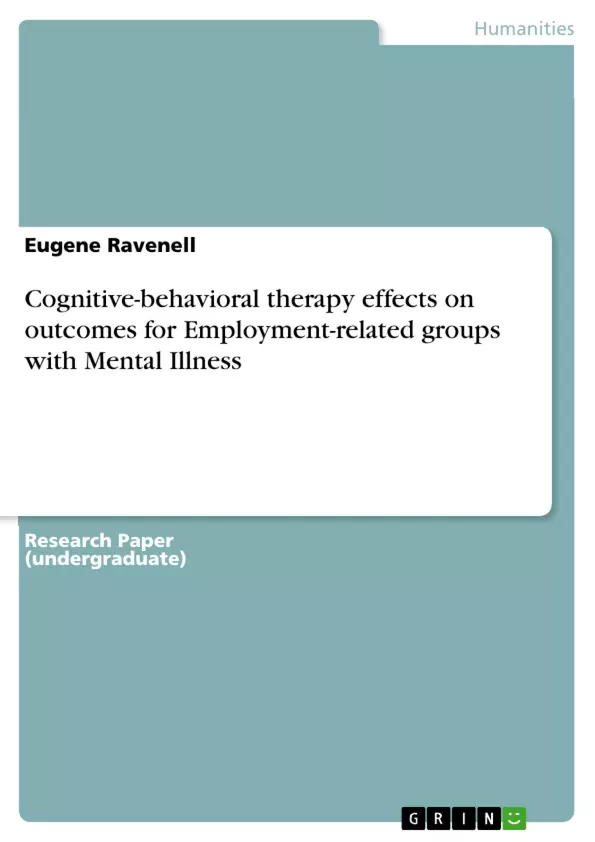Mental illness is a term that varies in its breadth and depth but is associated with an emotional or behavioral disorder (American Psychiatric Association, 2013). Approximately one in four people in the general population are affected by mental illness at some point in their lives (Kessler, Merikangas & Wang, 2008; World Health Organization (2001). Naturally, mental illness is associated with functional impairments that interrupt life activities (New Freedom Commission on Mental Health, 2003). Specifically, severe mental illness often impairs one's capacity to choose, obtain and keep a job and to earn a living (Tsang, Lam, Ng & Leung, 2000). Furthermore, WHO (2007) viewed the complementary condition of mental health as a state of well-being that allows someone to work. It is recognized that there are critical barriers to employment for people with mental illness (Lysaker, Davis, Bryson & Bell, 2009). These include difficulties with interpersonal relationships and with the completion of tasks at work. There are concomitant issues in coping with stigma and work stress as well as low levels of self-efficacy or self-defeating beliefs (Marwaha & Johnson, 2004).
Inhaltsverzeichnis (Table of Contents)
- Introduction
- Methods
- Study Selection and Data Extraction
- Methodological Quality Assessment
- Results
- Summary of Included Studies
- Outcomes of Vocational Functioning
- Outcomes of Mental Illness Functioning
- Discussion
- Limitations
- Conclusion
Zielsetzung und Themenschwerpunkte (Objectives and Key Themes)
This systematic review aims to synthesize empirical evidence on the effects of cognitive behavior group therapy (CBGT) on employment outcomes for individuals with mental illness. The research explores the effectiveness of different CBGT approaches, including vocationally-oriented and general CBGT, in improving vocational functioning, reducing symptoms, and enhancing mental health.
- The impact of cognitive behavior group therapy on employment outcomes for individuals with mental illness.
- The effectiveness of different CBGT approaches, including vocationally-oriented and general CBGT.
- The role of CBGT in improving vocational functioning, reducing symptoms, and enhancing mental health.
- The overall effectiveness of CBGT in improving both vocational and mental health outcomes for individuals with mental illness.
Zusammenfassung der Kapitel (Chapter Summaries)
- Introduction: This chapter provides an overview of mental illness and its impact on employment, highlighting the need for effective interventions like CBGT. It establishes the research question and the significance of this study.
- Methods: This chapter outlines the methodology employed for the systematic review, including the criteria for study selection, data extraction methods, and methodological quality assessment.
- Results: This chapter presents a summary of the included studies, including their characteristics, populations, and intervention types. It then analyzes the findings related to vocational functioning and mental health outcomes, highlighting the statistically significant effects of CBGT.
Schlüsselwörter (Keywords)
This review focuses on the application of cognitive behavior group therapy (CBGT) for individuals with mental illness, examining its effects on employment outcomes. Key concepts include vocational functioning, mental health outcomes, vocationally-oriented CBGT, general CBGT, and systematic review.
- Quote paper
- Eugene Ravenell (Author), 2018, Cognitive-behavioral therapy effects on outcomes for Employment-related groups with Mental Illness, Munich, GRIN Verlag, https://www.grin.com/document/428490



